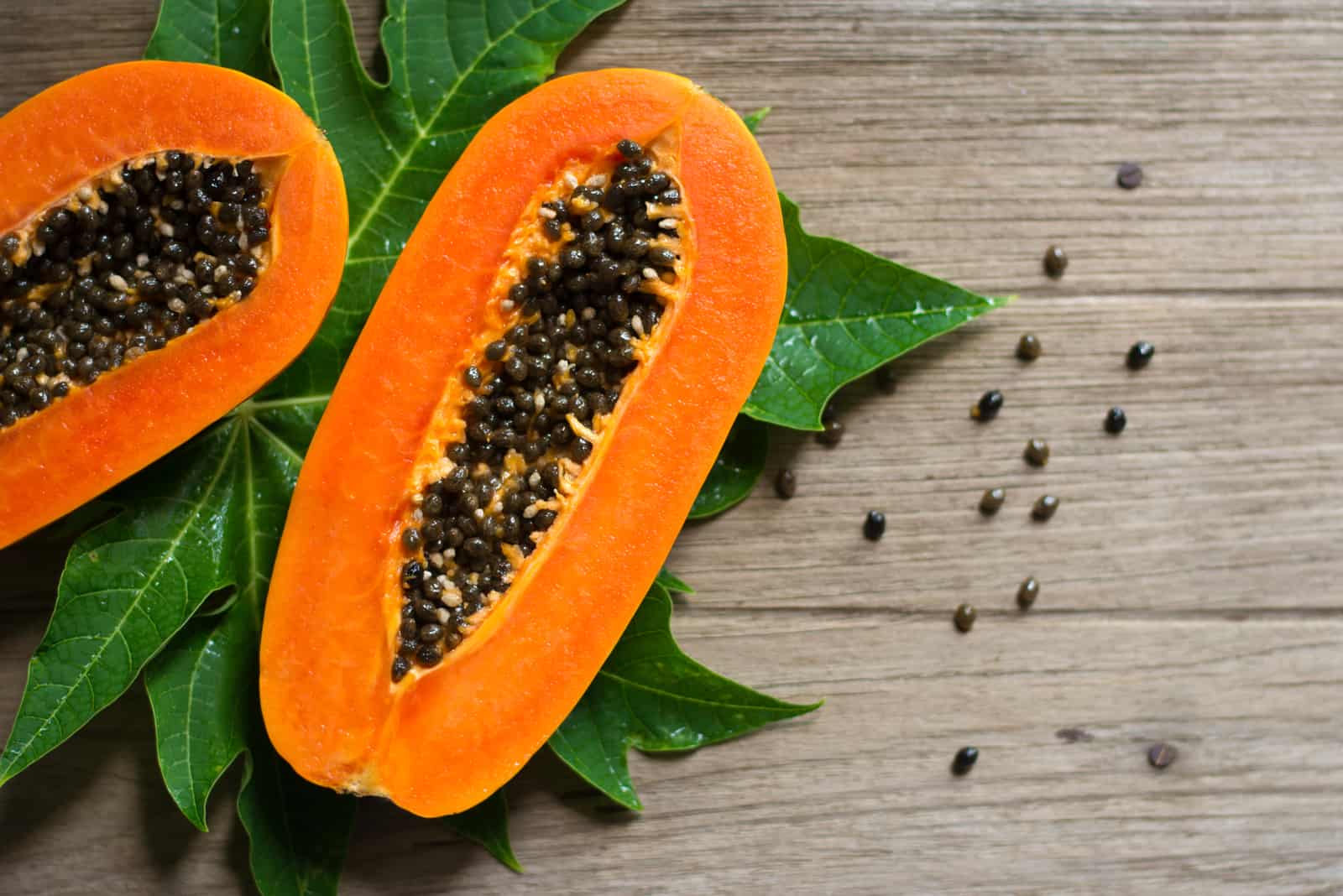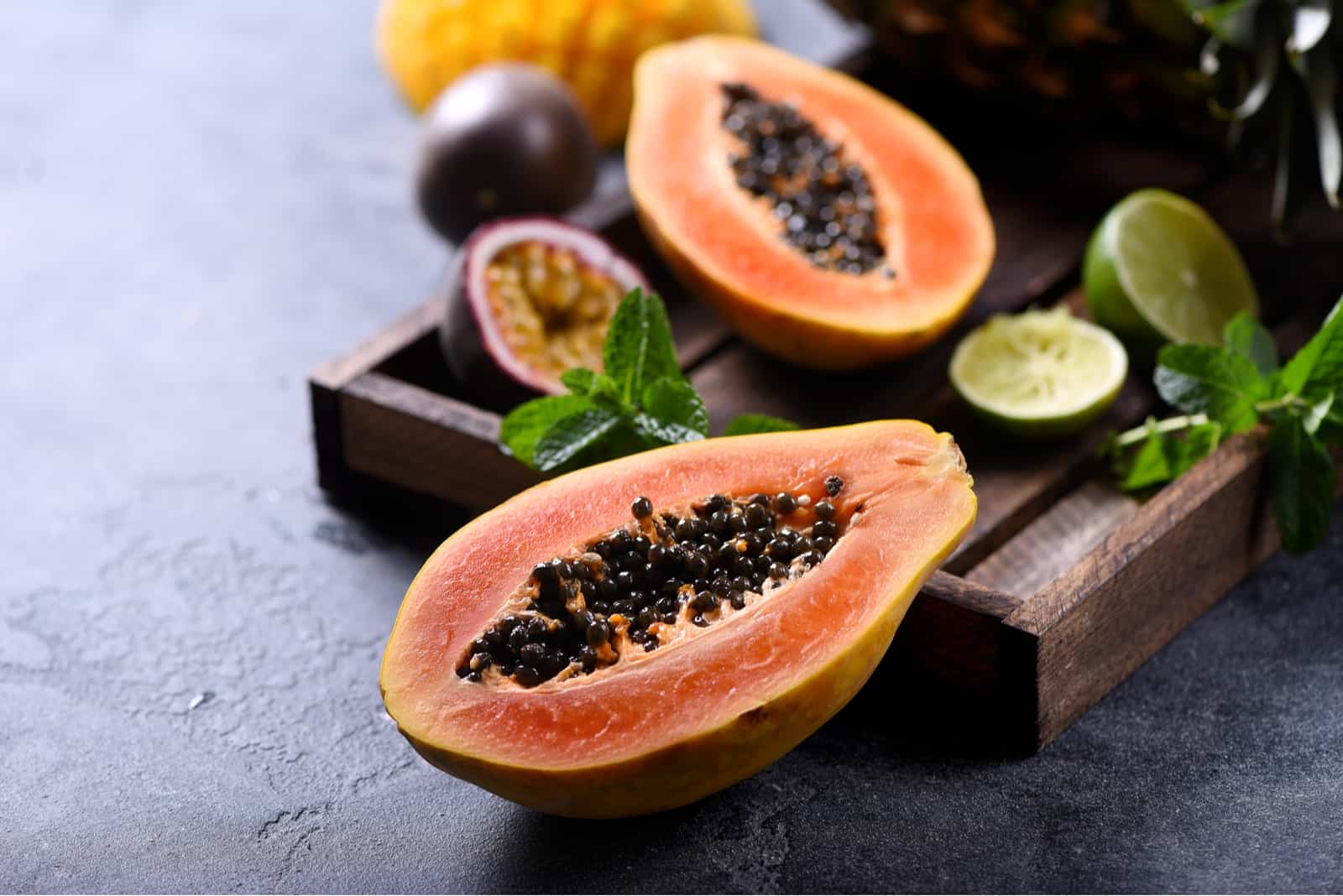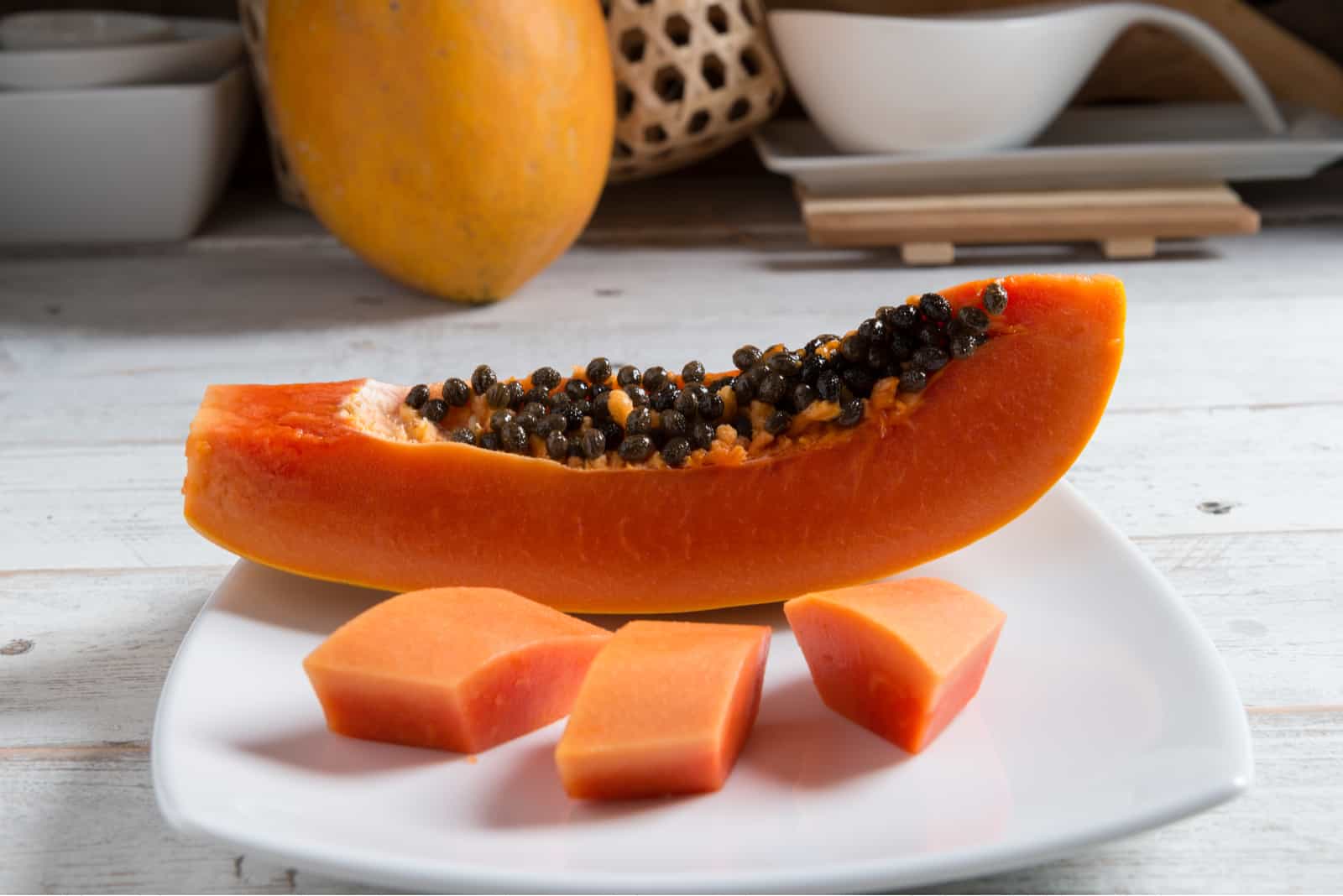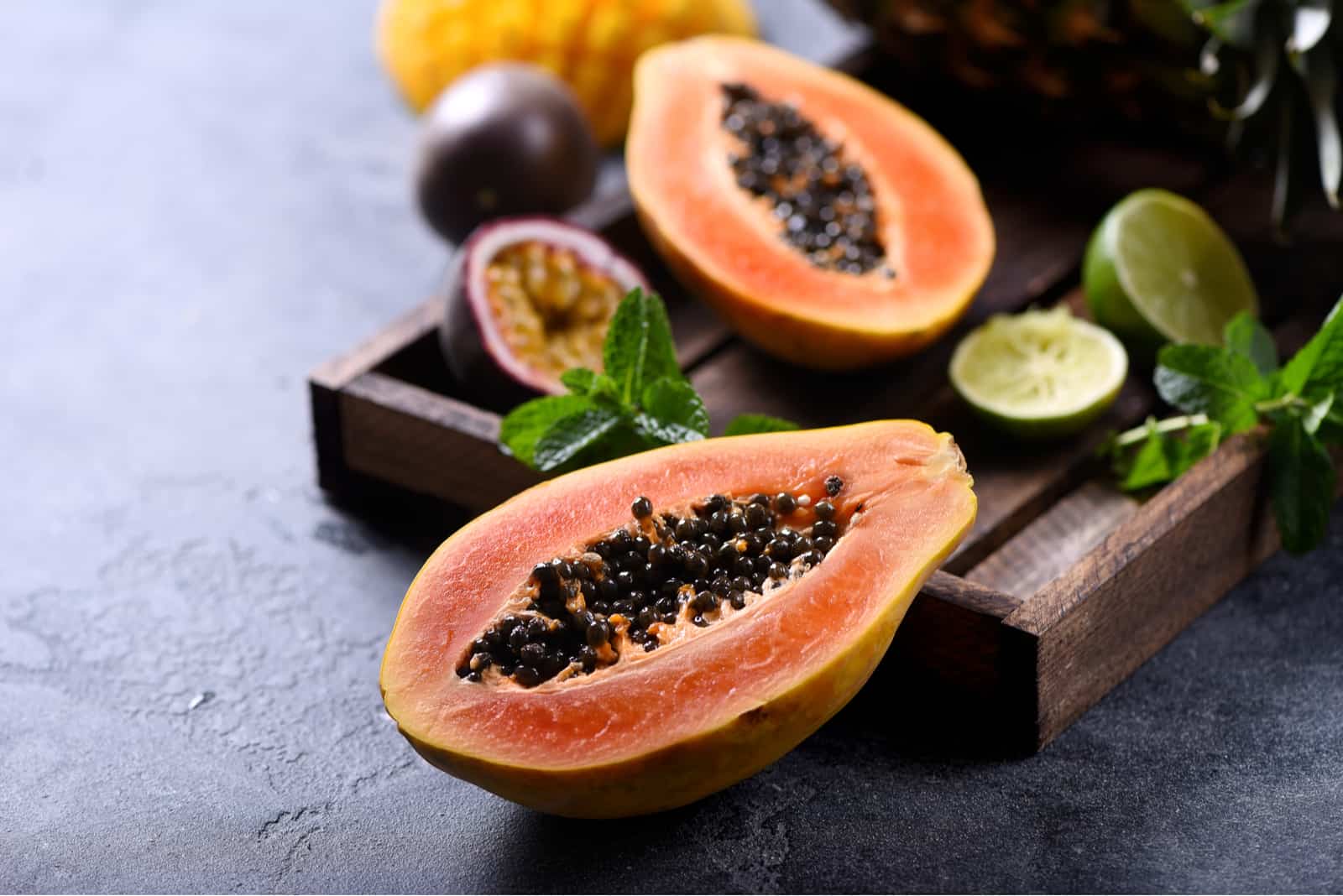Our beautiful planet is blessed with an amazing range of exotic, delicious fruits, many of which make excellent additions to our diet. The variety of flavors, textures, and aromas combined with the nutrition they provide makes them ideal as a healthy snack, though there is always the temptation to overindulge!
As dog owners, it’s only natural to wonder whether our doggy companions can share some of the foods we enjoy. It’s always best to check to see if it’s safe to do so, as some human foods are seriously bad for dogs!
In this article, we are investigating the humble papaya fruit. We’ll look into its health benefits, possible side effects, and answer the question, is papaya good for dogs?
What’s So Great About Papaya?

The internet is a fantastic tool that keeps us informed and entertained, but it can also cause confusion as it’s so easy to spread myths and misunderstandings. We’ll try to address some of these popular misconceptions along the way so that you have a better understanding of this superfruit.
To begin with, we’ll take a look inside to explore its nutritional value. One single papaya contains the following:
• Calcium – as you probably know, calcium is required for strong teeth and bones. However, it is also used by the brain to send signals to other parts of the body and move muscles, as well as playing a role in blood circulation and hormone release.
• Potassium – as the body doesn’t make this mineral naturally, it’s important to eat foods that contain it. Potassium assists in several body functions, including heart rhythm, blood pressure, nervous system, digestive system, and muscle activity.
• Folate (folic acid) – helps with red blood cell formation and healthy cell growth. This B vitamin is essential during pregnancy to prevent congenital disabilities related to the brain and spine.
• Magnesium – supports energy production, muscle, and nerve function.
• Vitamin C – a useful antioxidant that fights free radical particles. It plays a role in cardiovascular health, boosts the immune system, improves skin health, and aids iron absorption.
• Vitamin A – supports the immune system, normal eyesight, and keeps internal organs healthy.
• Papain – this enzyme makes it easier to digest protein and is used as a remedy for constipation and irritable bowel syndrome (IBS) in tropical regions. Some people don’t like the smell of this chemical, which is especially strong in the unripe fruit. Its digestive qualities make it useful for tenderizing meat.
• Lycopene – another very powerful antioxidant that neutralizes free radicals. These are particles that damage our cells and cause premature aging, contributing to cancers and conditions such as Alzheimer’s disease. Lycopene removes excess iron from the body, which is known to cause free radicals to form.
• Calories – 59.
• Carbohydrates – 15 grams.
• Protein – 1 gram.
• Fiber – 3 grams.
• Trace vitamins – B1, B3, B5, E, and K.
As you can see, this is one tropical fruit that has some excellent health benefits!
Before we get too excited, we need to look at some of the possible negatives.
The Dark Side Of Papaya

Even though myths and misconceptions abound, it’s always worth checking to see if there’s any truth in the rumors. Let’s look at a few examples.
Papaya Smells Really Bad!
Some people really can’t handle the smell. As mentioned earlier, this is because of the digestive enzyme called papain, which may smell a little like vomit to some people with sensitive noses! There are also those who don’t like the taste, saying that it is too bitter. The trick is to only eat ripe, fresh papaya, which should be sweet but not too sweet.
Do They Cause Miscarriages?
Many websites and health experts will recommend avoiding this fruit during pregnancy as it can cause miscarriage. The truth is, ripe papaya, eaten in moderation, will actually be beneficial, providing all the goodness we saw above.
Any risk involved lies within the leaves, roots, and unripe fruit, which contains high levels of latex and papain. Latex is a known allergen that can produce dangerous allergic reactions. It can also trigger contractions of the uterus, which could lead to early labor. Likewise, papain can be mistaken by the body for prostaglandins, chemicals used to induce labor. There is also a chance that this enzyme could damage the membranes supporting the fetus.
So, papaya fruit is safe to eat when pregnant, as long as it is ripe and only in moderate amounts.
The Seeds Contain Poison!

Photo from @louthenicadog
It’s true, as with many other fruits (apricot, apple, cherries, plums, peaches, etc.), there are trace amounts of cyanide in papaya seeds. The amounts are too small to be significant, but it’s best to avoid eating too many.
They are equally as healthy as the main fruit, but it is not recommended that you consume more than one teaspoon per day.
Evidence suggests that excessive consumption can cause congenital disabilities, reduce sperm levels in men, and cause diarrhea.
It Damages Your Throat
Again, this is down to the presence of papain and the consumption of unripe fruit. The key is to only eat ripe fruit in moderation. This fruit is still being investigated for its potential antifungal, antioxidant, antibacterial, and anti-inflammatory qualities, which has led to the production of papain supplements. When taken in large doses, this papaya enzyme can damage the esophagus.
Conversely, when the fresh fruit is consumed in sensible amounts as part of a balanced diet, it can actually improve sore throats! The problem is that many people mistake natural for safe, without considering all of the facts.
Some of the misunderstandings surrounding this exotic fruit come from the fact that different parts of the fruit are used in some countries. For example, the leaves are used to make an infusion, or, as we discovered above, the seeds are eaten.
To avoid confusion and get the best (and safest) results, stick to eating ripe fruit only.
Now that we know a little more about the health benefits of papaya and have separated fact from fiction, we’ll dig a little deeper to see how they can affect our furry friends.
Is Papaya Safe For Dogs?

The most important thing to remember is that your dog should be getting all the nutrition it needs from its regular dog food. Anything else should be a supplement or a healthy treat.
Introducing new foods to a dog can be a tricky process. They are notoriously fickle and sensitive to diet changes, so any new foods should be introduced gradually and in small quantities.
Too much of any new type of food may cause them digestive issues, and you should take care to watch out for any signs of an allergic reaction.
As with some humans, there is a chance that they may not like either the smell or taste of the fruit. If this is the case, don’t force them to eat it! Doing so could end badly, especially if it gives them an upset stomach!
If you do give your dog papaya, cut it into small slices and avoid giving them the seeds (as mentioned above). Any food can present a choking hazard, so make sure you cut it into bite-sized chunks. You should also make sure that the skin is removed as it is tough and difficult for dogs to digest, which can cause intestinal blockage.
Don’t be tempted to give them too much of this fruit if they show a liking for it. Although you might feel that you’re giving them a treat, too much papaya will result in gastrointestinal issues. This is because the sugars (fructose & sucrose) in this fruit are not a natural part of a dog’s diet, and too much fiber will affect their digestive system.
Having said this, some people have found that a small amount of papaya actually eases their dog’s digestive problems and *bloating due to excessive gas.
As a rough guide, about one or two slices per day for a medium-sized dog will suffice.
Dehydrated papaya is sometimes recommended as an alternative to fresh fruit, but this isn’t a good idea as the sugar content is often much higher. This is bad news for any dog, especially those that are diabetic!
So, overall, it seems that we can say that papaya is generally safe for dogs, but there are precautions to follow.
*This refers to general bloating connected with flatulence, not the potentially fatal condition called bloat! This is also known as gastric dilatation-volvulus (GDV) and is common in large, deep-chested dogs.
In A Nutshell

There’s a lot of information to take in here, so let’s take a moment to summarize what we’ve learned to get it clear in our minds:
We asked at the beginning, can dogs eat papaya?
The answer is yes! However, we need to bear in mind some important rules, as follows:
• Only use fresh, ripe papaya as the unripe fruit not only tastes unpleasant but will also have larger amounts of latex and papain.
• Remove all of the peel as it is difficult to digest. This won’t just cause indigestion; it may also result in a blockage inside the dog’s digestive tract!
• Feed your dog a very small amount at first, and check for any signs of an allergic reaction, as well as vomiting or diarrhea. Obviously, you should stop giving them papaya if you notice any of these things.
• The fruit should be cut into small pieces, and you should only give your dog a few slices or cubes of fruit a day. The keyword is balance! If your dog is suffering from gas or indigestion, a few slices of papaya will help ease this. However, too much of this fruit will add to or even cause digestive issues.
• Don’t be tempted to give them dried papaya, even as an occasional treat. These will have even more sugar (probably processed) than fresh fruit and will be unhealthy.
• Avoid feeding your dog papaya seeds. This is a precaution, as the amount of cyanide in them is minimal, but there is evidence that the seeds can cause intestinal blockage.
• Frozen papaya is an option, especially refreshing on a hot day, but avoid this if your dog has sensitive teeth.
In the end, your dog’s health is the main issue here. They rely on you to judge whether certain foods are safe for them to eat.
If they show no signs of allergy or adverse reaction, then a few pieces of papaya will benefit them. It’s best not to give this to them every day, as the effects may build up over time. Try staggering it, perhaps treating them to a few slices three or four days in a row, then having a break for a few days.
Dogs are not natural fruit-eaters, but they will enjoy the odd healthy treat now and then and will love you all the more for it!

